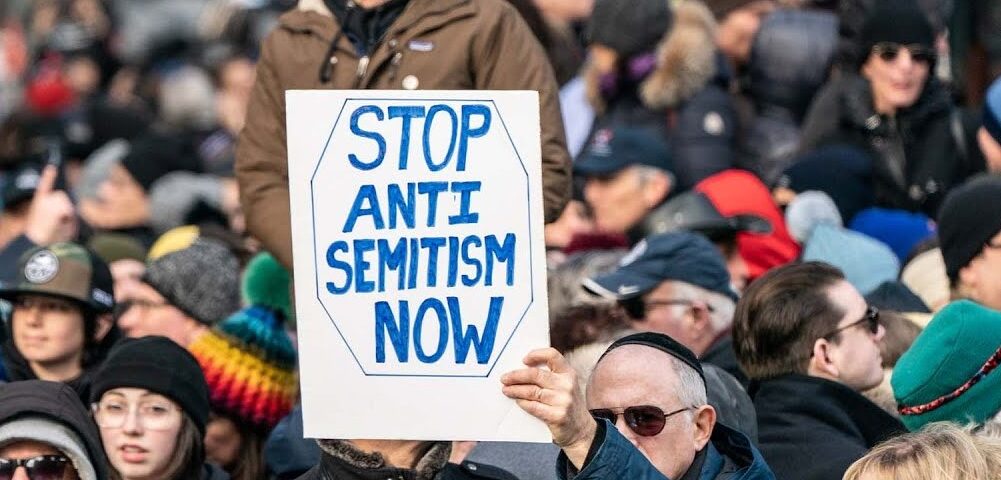TRADITION QUESTIONS: Naming the Monster

 Click here to read about this series.
Click here to read about this series.
“Before you can kill the monster you have to say its name.” —Terry Pratchett A Slip of the Keyboard
What is it?
Israel’s Government Naming Committee has begun to debate renaming “Swords of Iron.” In Israel, military operations are assigned a random name at the outset from a predetermined list. Afterwards, a new name is often chosen to reflect events in the war and its significance.
Jewish thinkers have begun a similar – if less official – task. They are giving names to the antisemitism that is taking shape simultaneously with the war. While the equation of anti-Zionism with antisemitism has led to a decades-long debate regarding “New Antisemitism,” the current legitimizing of explicit expression of Jew-hatred demands new terminology.
The absence of a single name complicates communicating what the monster is and how it might be fought. Different names convey dissimilar manners in which antisemites “other” the Jew. Naming the monster can lead us toward or away from useful responses. If we choose a name that implies our oppressors are motivated by a perceived ideological or political flaw in ourselves that subtly leads to one set of responses. Perhaps, one imagines, we can adjust our politics and be granted indulgence.
Simon Sebag Montefiore, writing in The Atlantic, uses the word “Decolonization”:
The decolonization narrative has dehumanized Israelis to the extent that otherwise rational people excuse, deny, or support barbarity. It holds that Israel is an “imperialist-colonialist” force, that Israelis are “settler-colonialists,” and that Palestinians have a right to eliminate their oppressors… The argument is that it is almost impossible for the “oppressed” to be themselves racist, just as it is impossible for an “oppressor” to be the subject of racism. Jews therefore cannot suffer racism, because they are regarded as “white” and “privileged”; although they cannot be victims, they can and do exploit other, less privileged people, in the West through the sins of “exploitative capitalism” and in the Middle East through “colonialism.”
Decolonization emphasizes a European political context in which Jews are treated as non-indigenous to the land. The term makes the Jew a scapegoat for Western guilt for the crimes of colonization. R. David Wolpe, in resigning from the antisemitism advisory committee at Harvard University, uses “axes of oppression.” Writing on the platform formerly known as Twitter, he explains this phrase emphasizes the plotting of Jewish suffering relative to that of others as if on a graph – while at the same time evoking World War II and the Holocaust:
The ideology that grips far too many university students and faculty, the ideology that works only along axes of oppression and places Jews as oppressors—and therefore intrinsically evil—is itself evil. Ignoring Jewish suffering is evil. Belittling or denying the Jewish experience, including unspeakable atrocities, is a vast and continuing catastrophe. Denying Israel the self-determination as a Jewish nation, accorded unthinkingly to others, is endemic and evil.
Bari Weiss uses “Identity Marxism” among other terms:
For Jews, there are obvious and glaring dangers in a worldview that measures fairness by equality of outcome rather than opportunity. If underrepresentation is the inevitable outcome of systemic bias, then overrepresentation—and Jews are two percent of the American population—suggests not talent or hard work, but unearned privilege. This conspiratorial conclusion is not that far removed from the hateful portrait of a small group of Jews divvying up the ill-gotten spoils of an exploited world… Of course, this new ideology doesn’t come right out and say all that. It doesn’t even like to be named. Some call it wokeness or anti-racism or progressivism or safetyism or Critical Social Justice or identity Marxism.
Identity Marxism speaks to the monster’s totalitarian and illiberal fangs. The monster’s name shapes how we frame our thinking about our own victimhood/empowerment.
Why does it matter?
Names matter. They allow people to communicate more clearly. They condition thinking about the subject to which the name refers. A military operation is not a war—until it becomes a war. People make great sacrifices for their country. Those collective sacrifices must be justified in the public imagination. Names are one ingredient in this process.
The Jewish people have many names for the persecutions we have endured, among them Crusade, Pogrom, Ghetto, Inquisition, Farhud, Intifada, and Holocaust. Yet, to describe the hatred itself we use an undifferentiated term: Antisemitism. While common genes flow through antisemitism’s many forms, it has a way of mutating. R. Jonathan Sacks expressed it in this way:
Before the Holocaust, Jews were hated because they were poor and because they were rich; because they were communists and because they were capitalists; because they kept to themselves and because they infiltrated everywhere; because they clung to ancient religious beliefs and because they were rootless cosmopolitans who believed nothing.
What would we gain by having differentiated names for Jew-hatred?
As we do with wars, names would allow us to see more clearly, and to identify and understand the specific form of antisemitism that we are experiencing. Bari Weiss suggests that the monster does not want to be named. This makes naming it that much more important. How might we call this monster by one name?
What questions remain?
In presuming that antisemitism is a monster that can be fought, do we assume agency and power that we don’t have?
Who is the one responsible to fight this monster? Is it a Jewish “we”? Upon what allies can we call to help us?
Why is this monster growing now? What created the ideological vacuum in which this hatred could grow? What ideology can we offer to replace this monster and help the world understand itself?
Chaim Strauchler, an associate editor of TRADITION, is rabbi of Cong. Rinat Yisrael in Teaneck.
